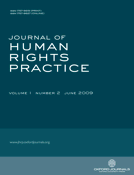 The global economic crisis poses a severe threat to economic and social rights, but it is also an opportunity to rethink how we hold states accountable for their fulfilment.
The global economic crisis poses a severe threat to economic and social rights, but it is also an opportunity to rethink how we hold states accountable for their fulfilment.
In a new article published in the Journal of Human Rights Practice, CESR Executive Director Ignacio Saiz argues that now, more than ever, the human rights movement needs to vigorously articulate fundamental principles that cannot be rescinded even in times of recession. This paper demonstrates how these principles should guide policy responses to the crisis.
This involves intensifying efforts to identify new methods and venues through which to scrutinize governments' compliance with their obligations to fulfil economic and social rights.
The crisis is also an opportunity to rethink the role of the state in regulating the creation of wealth and redistributing its benefits towards the universal realization of economic and social rights. The transnational impacts of the crisis highlight the need to frame accountability in global terms, and to assert more vigorously the notion that states' responsibilities to respect, protect, and fulfil economic and social rights do not stop at their national borders.
As responses to the crisis have shown, the progress made in advancing the legal justiciability of economic and social rights has not been matched in the arena of politics and public policy. Bridging this gap will involve releasing the still-latent potential of economic, social, and cultural rights advocacy as a powerful tool for social mobilization and transformation.
CESR's community can also access a free download of the PDF version of this article.